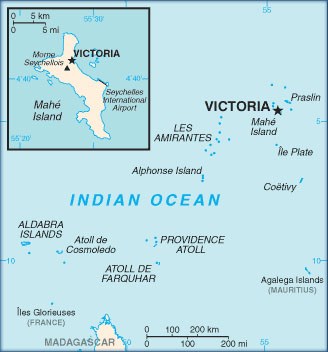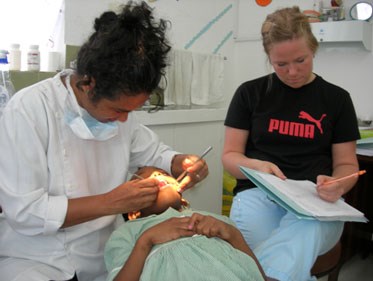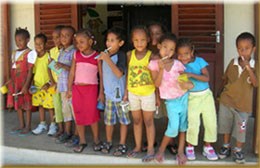Seychelles - Dental Public Health Programmes
Seychelles - Dental Public Health Programmes
Dental public health programmes in Seychelles (2008)
by Kathline Ernesta
Introduction
The Seychelles Dental Services consists of two major units, namely the Adult Dental Service and the School Dental Service. Whilst the 2 units have their separate objectives, they work together, so as to attain the overall purpose of the Seychelles Dental Services, and consequently that of the Ministry of Health of Seychelles.

Map from The World Factbook
Background
The School Dental Service consists solely of Dental Therapist-Hygienists who plan and conduct their work under the management of the Principal Dental Therapist-Hygienists, who in turn reports to the Director of the Dental Services. The Dental Therapists-Hygienists firstly provide dental services to the child population until the child leaves school, and secondly provide dental hygiene services to adult patients referred by Dental Officers. The School Dental Service also has good working relationship with the Ministry of Education that contributes to effective implementation of school dental programmes. As and when schools are renovated or new ones built, provision is made for a school dental surgery on the school campus.
The Adult Dental Services is managed by the Director of the Service and comprise dentists and specialists. Services offered range from basic preventive and restorative procedures to more specialised areas such as prosthodontics, orthodontics and maxillo-facial surgery.

Kathline Ernesta (Dental Therapist) and Josefine Johansson
(now working as a Dentist in Halmstad, Sweden)
On-going Dental Public Health Programmes
The Dental Therapist-Hygienists plan and implement various oral health related activities such as exhibitions, media programmes etc. intermittently, as and when requested by different social organisations
Following the results of the first national surveys of 1993/1994, the School Dental Service launched 2 national programmes:
- The antenatal, maternal and child oral health (MCOH) programme.
- The school oral health (SOH) programme.
The ANC/MCH programme (1999 to date)
Personnel:
Dental Therapists, Dental officers and Maternal & Child Health nurses.
Target:
Mothers and young children from birth onwards (until the children enrol on the school programme)
Primary goal:
To raise the oral health status of the very young infants, (i.e. improve oral hygiene and decrease level of dental caries in that population group).
Main objectives:
- To prevent pregnant mothers from developing oral health problems during pregnancy.
- To reduce nursing bottle syndrome prevalence in the young children.
- To increase the level of good oral health (i.e. reduce dental caries and increase good oral hygiene) in the young children.
Main components:
When the pregnant mothers attend ante-natal clinic (ANC), they are given dental appointments for check-up, given counselling for themselves and for new babies.
After birth of child, 6 weeks appointment with dental therapist for counselling on oral hygiene of baby and feeding practices, and thereafter 3 and 6 months follow up visits until they enrol at school.
The national school oral health programme (1998 to date)
Personnel:
Dental Therapists with assistance of school staff.
Target:
All children of state schools.
Primary goal:
To raise the oral health status of school children (i.e. improve oral hygiene and decrease level of dental caries in that population group).
Main objectives:
To reduce sugar intake in the group (in terms of both amount and frequency) to a level compatible with oral health.
Give optimal fluoride exposure.
To reduce overall amount of plaque accumulation in the group.
ensure optimal use of dental service.
Main components:
Dental examination of all the children with follow up appointments for necessary treatment.
Weekly fluoride mouth rinse, and dental health education, individually or as a group at school.

Acknowledgements
CAPP would like to thank Dr Anders Tillberg for his support and advice in preparing this presentation.
